Professionals with skills related to digital technologies, sustainability management and entrepreneurship appear to be in high demand in Europe's performing arts sector, a new report reveals. The importance of social and resilience skills is also highly valued by professionals in the sector.
The INSPIRE project, funded by the ERASMUS programme and organised by Pearle *, with lead researcher Dr. Matina Magkou, seeks to map the current situation and identify the gaps and barriers to the development of these skills among existing and future performance production managers, set designers, artistic and stage directors, facility managers and stage technicians. It also aims to carry out a needs analysis of the sector, particularly in each of the countries involved in the project (Austria, Belgium, Greece, Italy and Spain) but also on the European level.
Ultimately, the project aims to enhance the green, digital, entrepreneurial, soft and resilience skills of existing and future professionals in the performing arts sector, and to upskill vocational and higher education professionals in a holistic and innovative way.
During the process, 235 people were involved to ensure the equal representation and the validity of results. The report follows a double approach quantitative and qualitative.
Green skills
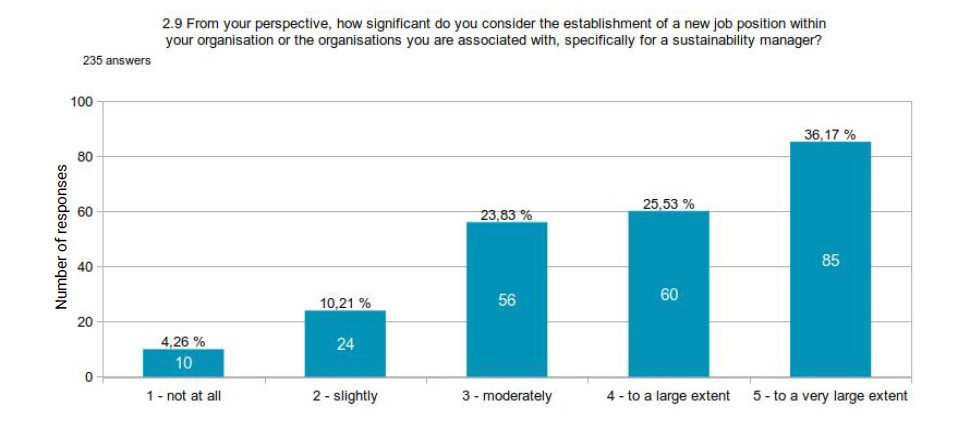
According to the findings of the report, only 17.45% of the organisations surveyed already have a sustainability manager position, while more than 50% of the participants consider the creation of such a position to be very important or important. The first factor due to which the position of sustainability manager has not yet been envisaged is considered to be the lack of financial resources (62.13%), followed by competing priorities (49,36%).
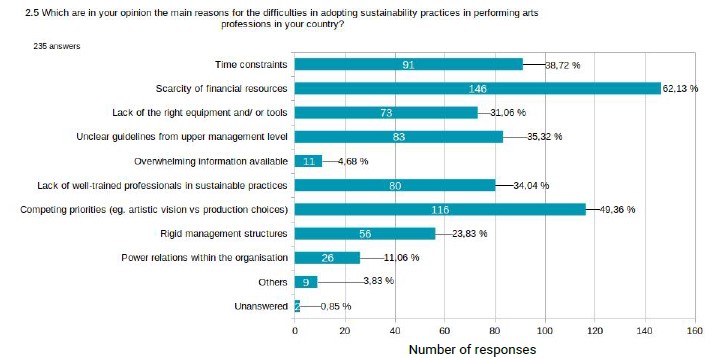
In spite of the importance and high ratings given to the need for green skills by performing arts professionals, there is a general perception that the sector is not proficient in these skills. 82% of respondents believe that the sector has average to low competence in green skills.
When asked which professional profiles were most in need of specific green skills, respondents said that sustainable production techniques were most needed by production managers and set designers (22%), green venue management skills were most needed by facility managers (29%), and environmentally conscious performance practices were most needed by production managers (23%). Green touring skills are highly valued for production managers (31%) and the ability to raise environmental awareness among audiences is seen as an important skill mainly for artistic directors (29%).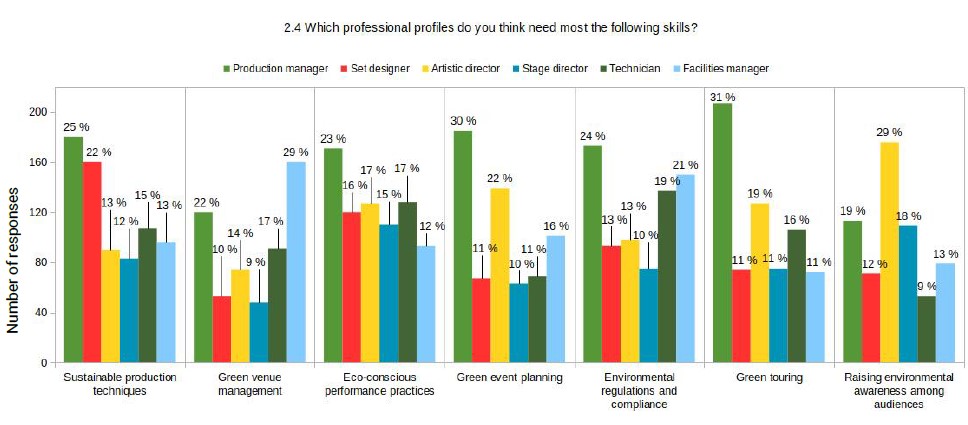
According to the authors of the report, there is interest from the sector and from professionals of different generations to develop green skills and competences within the performing arts sector. There is a high level of concern among younger generations who feel that this element should become part of their educational curriculum and lifelong training and practice.
Surprisingly, however, they also observe that professionals don't necessarily feel that they personally need to develop these skills. They place more responsibility on the top management of performing arts organisations and their ability to bring about change in organisational culture.
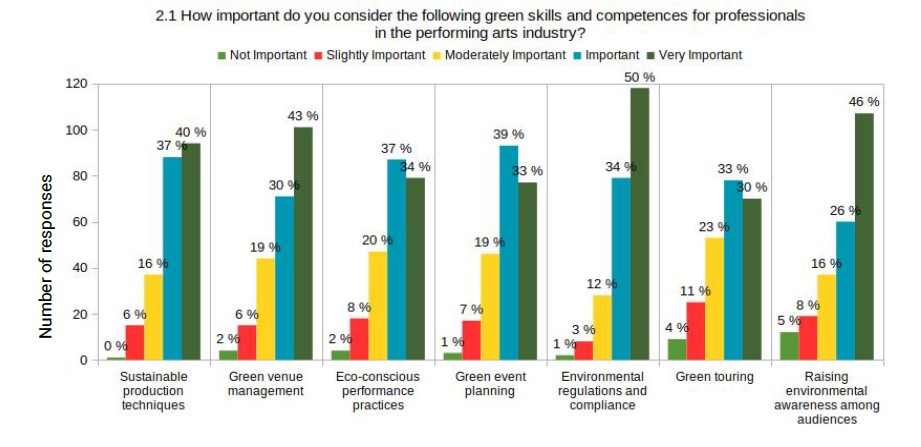
Many of the respondents emphasised that the existence of regulations and compliance specific to the performing arts sector at their national level has helped them to develop skills and competencies, but it is a challenge to cultivate this environmentally conscious attitude in all staff. Given the specificities of the sector, the need to address both permanent staff within performing arts organisations and freelancers is also an additional challenge.
The same applies to touring, where some respondents stressed that they don't have the power to impose processes on touring companies.
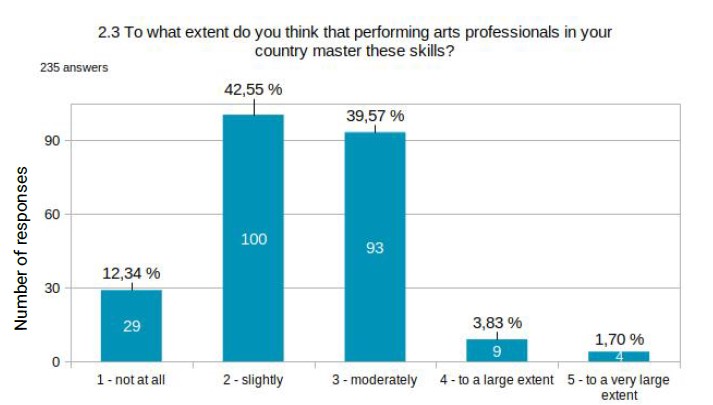
Finally, environmental literacy is seen as necessary by professionals in the sector, but they are concerned that it could become a tick-box exercise that they have to implement operationally.
Digital skills

Digital skills are in high demand in the performing arts sector, especially those that are specific to the sector (e.g. multimedia set design, virtual and augmented reality in performance, special effects and advanced video production or interactive and immersive media) and are crucial both for adapting to modern technologies and for reaching wider audiences.
The research showed that there is a high expectation for professionals to master such skills, but very few professionals can specialise in specific new technologies adapted to the performing arts sector. When asked about this, over 62% of respondents said that the majority of professionals do not have these skills.
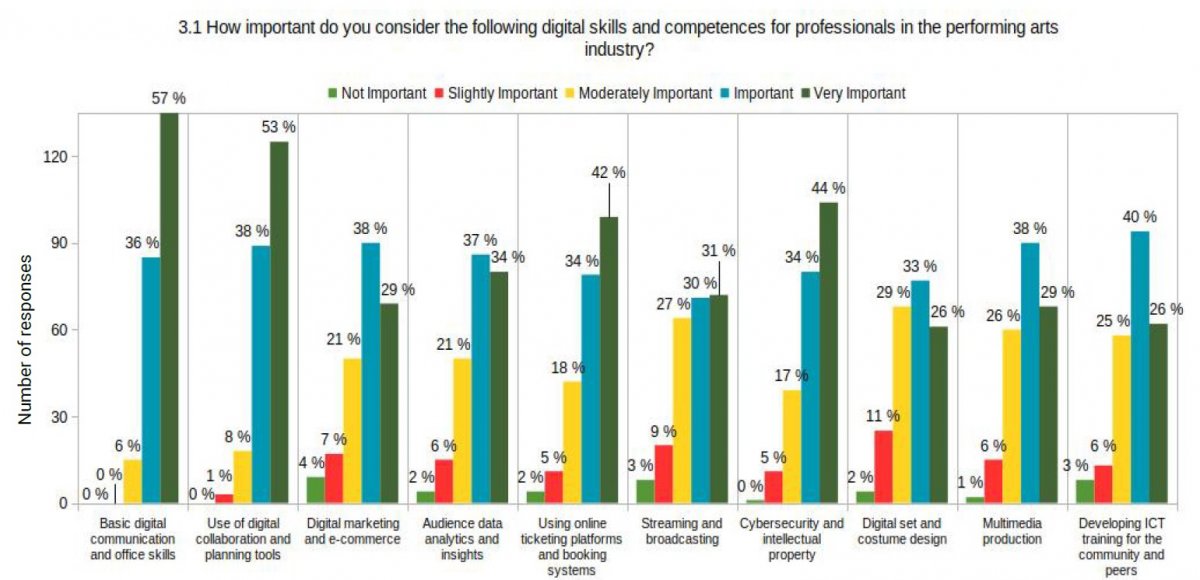
The main factors hindering the development of these skills are limited financial resources (51.91%) and lack of appropriate equipment (46.81%).
Most importantly, digital skills are needed by all professional profiles in the sector when it comes to basic office and digital communication tools and the use of digital communication platforms. As the performance of the sector is largely based on collaboration, these are considered basic skills that need to be improved and developed.
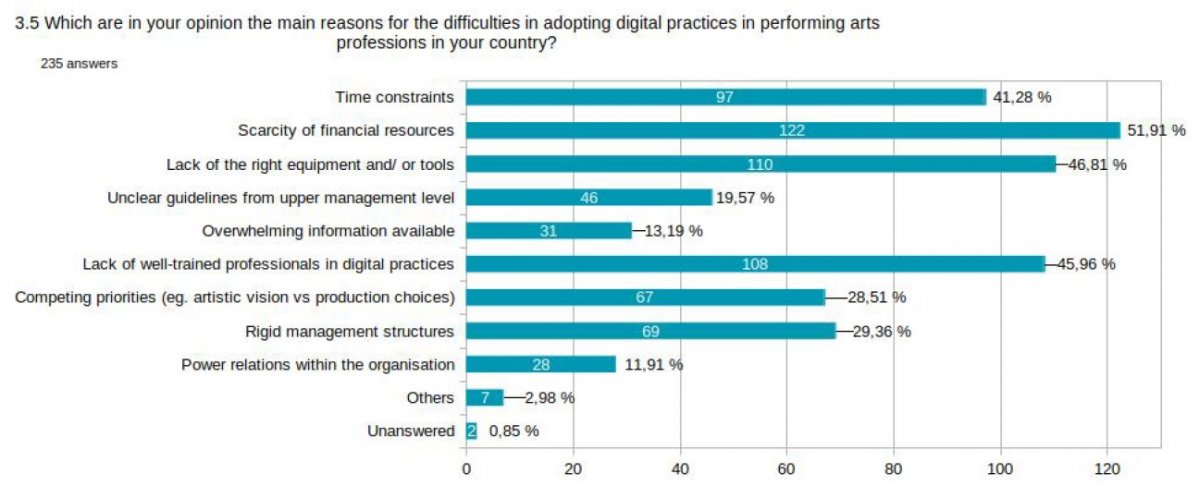
The professionals consulted underlined that, although familiarity with such tools may be affected by generational differences, most professionals need to develop the capacity to consider this aspect in a lifelong learning perspective, developing the curiosity and ability to navigate through new technological advances.
Entrepreneurial / resilience skills
Entrepreneurial skills for performing arts professionals refer to the skills and competencies that enable individuals to navigate the complexities of the industry and adopt an entrepreneurial mindset characterised by a willingness to seize opportunities, take initiative and develop resilience to bring about change in the organisation they work for.
Performing arts professionals place a high value on entrepreneurial skills. Problem solving (77%), innovative thinking (63%), communication and networking are seen as the most important entrepreneurial skills.
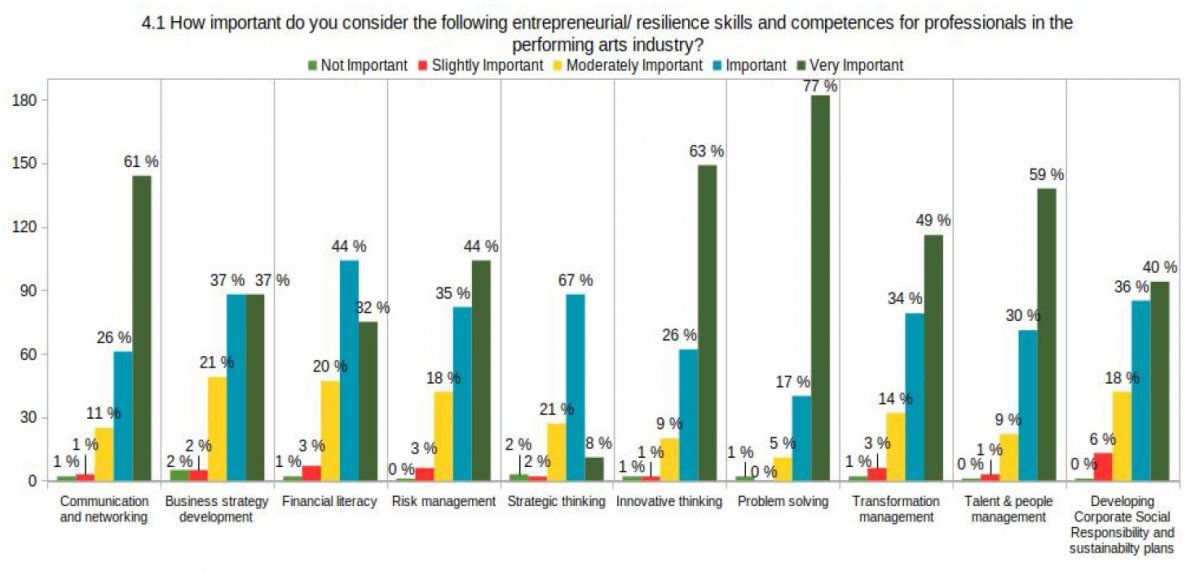
Although some of the identified skills are considered by the professionals interviewed to be inherent to the performing arts sector, there is a clear indication that time (50.64%), financial constraints (48.94%) and lack of well-trained professionals (43.40%) are barriers to developing these competences.
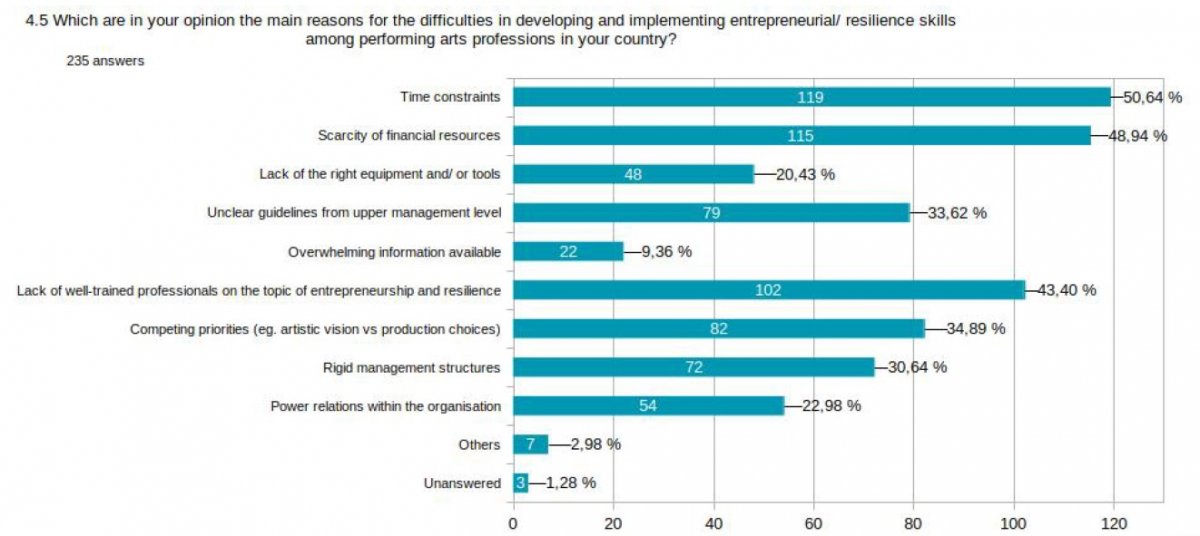 Soft skills
Soft skills
Performing arts professionals rate the importance of all soft skills very highly. Collaboration (80%), promoting respectful behaviour across power relations (72%) and flexibility (70%) are rated as the most important of all.
Respondents feel that soft skills are largely absent from the skillset of their colleagues in the workplace and that their level of mastery is average.
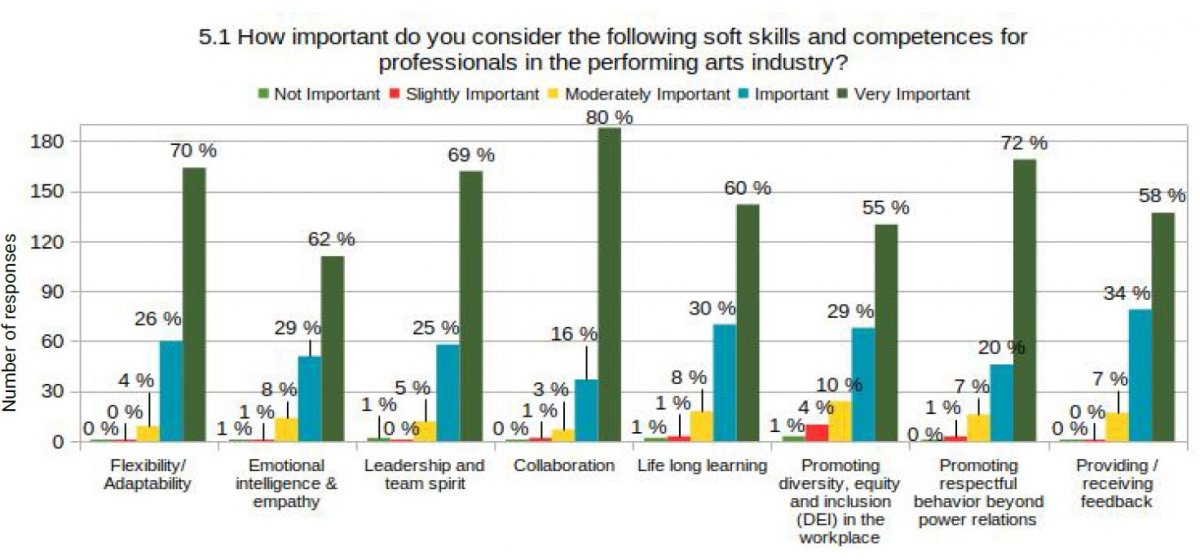
On the other hand, most of them consider themselves to have a good level of mastery of soft skills, but would be very interested in receiving training in this area. Power relations (51.49%) and rigid management structures (43.83%) are among the main reasons preventing professionals from developing their skills.
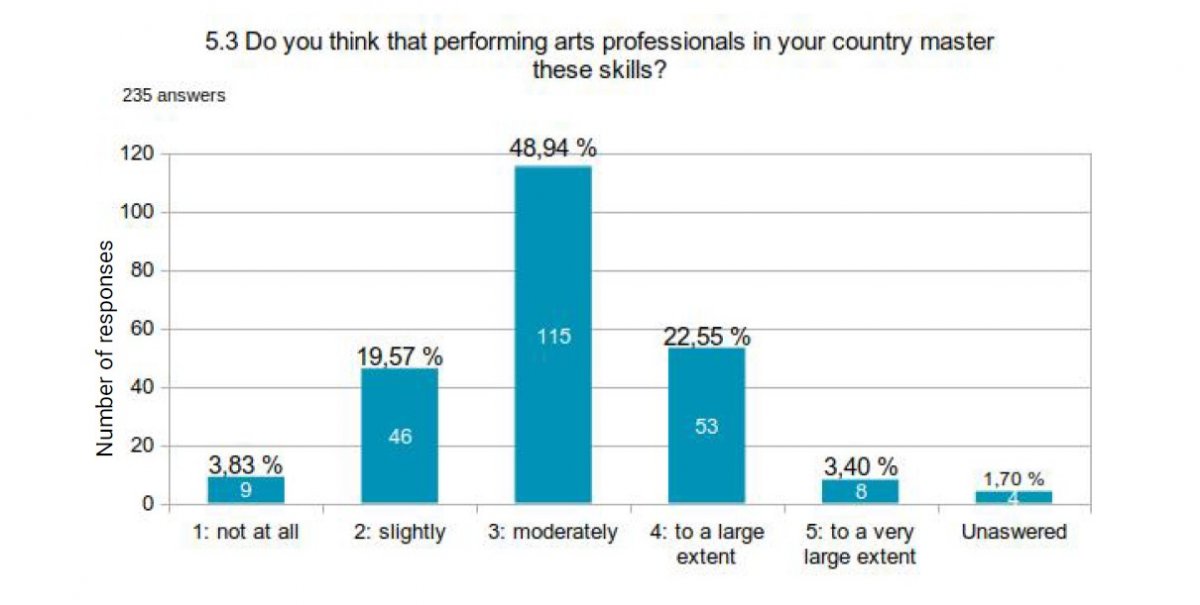
You can read the report here
--
Photo credit: Jorge Royan
Photo source








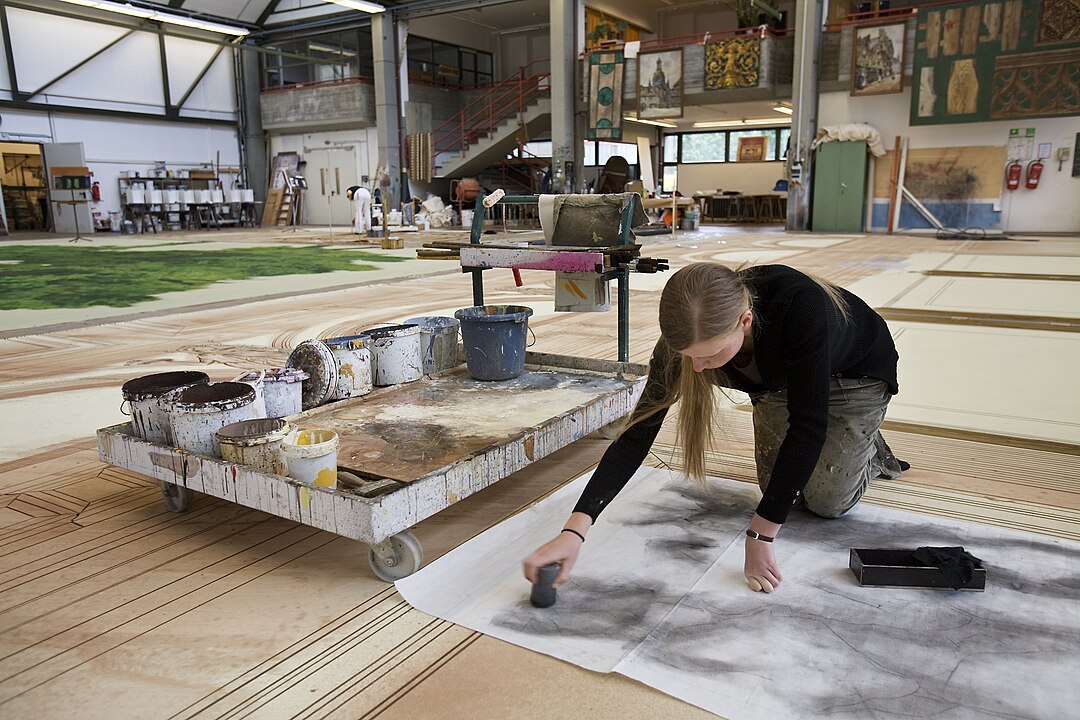









 Soft skills
Soft skills
